英语语法——代词与数词
英语语法--代词
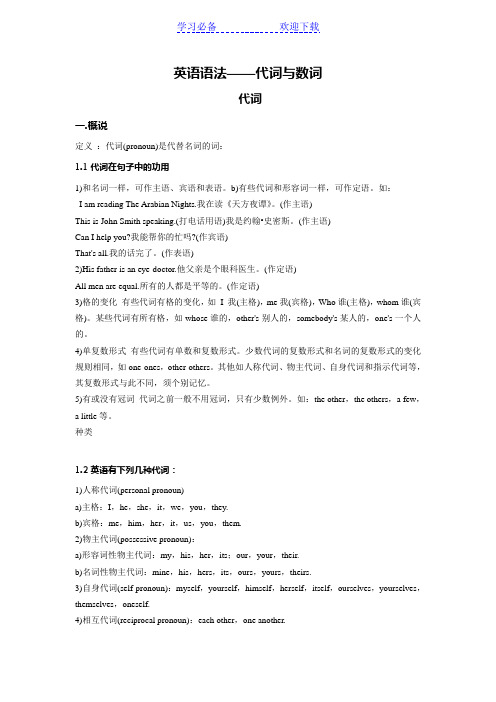
英语语法——代词与数词代词一.概说定义:代词(pronoun)是代替名词的词:1.1代词在句子中的功用1)和名词一样,可作主语、宾语和表语。
b)有些代词和形容词一样,可作定语。
如:I am reading The Arabian Nights.我在读《天方夜谭》。
(作主语)This is John Smith speaking.(打电话用语)我是约翰•史密斯。
(作主语)Can I help you?我能帮你的忙吗?(作宾语)That's all.我的话完了。
(作表语)2)His father is an eye-doctor.他父亲是个眼科医生。
(作定语)All men are equal.所有的人都是平等的。
(作定语)3)格的变化有些代词有格的变化,如I 我(主格),me我(宾格),Who谁(主格),whom谁(宾格)。
某些代词有所有格,如whose谁的,other's别人的,somebody's某人的,one's一个人的。
4)单复数形式有些代词有单数和复数形式。
少数代词的复数形式和名词的复数形式的变化规则相同,如one-ones,other-others。
其他如人称代词、物主代词、自身代词和指示代词等,其复数形式与此不同,须个别记忆。
5)有或没有冠词代词之前一般不用冠词,只有少数例外。
如:the other,the others,a few,a little等。
种类1.2英语有下列几种代词:1)人称代词(personal pronoun)a)主格:I,he,she,it,we,you,they.b)宾格:me,him,her,it,us,you,them.2)物主代词(possessive pronoun):a)形容词性物主代词:my,his,her,its;our,your,their.b)名词性物主代词:mine,his,hers,its,ours,yours,theirs.3)自身代词(self-pronoun):myself,yourself,himself,herself,itself,ourselves,yourselves,themselves,oneself.4)相互代词(reciprocal pronoun):each other,one another.5)指示代词(demonstrative pronoun):this,that,these,those,such,same.6)疑问代词(interrogative pronoun):who,whom,whose,which,what.7)关系代词(relative pronoun):who,whom,whose,which,that.8)不定代词(indefinite pronoun):some,something,somebody,someone,any,anything,anybody,anyone,no,nothing,nobody,no one,every,everything,everybody,everyone,each,much,many,little,a little,few,a few,other,another,all,none,one,both,either,neither.二.人称代词概说表示"我',、"你"、"他"、"我们"、"你们"、"他们"等的词,叫做人称代词。
英语语法——代词与数词

英语语法——代词与数词代词一.概说定义:代词(pronoun)是代替名词的词:1.1代词在句子中的功用1)和名词一样,可作主语、宾语和表语。
b)有些代词和形容词一样,可作定语。
如:I am reading The Arabian Nights.我在读《天方夜谭》。
(作主语)This is John Smith speaking.(打电话用语)我是约翰•史密斯。
(作主语)Can I help you?我能帮你的忙吗?(作宾语)That's all.我的话完了。
(作表语)2)His father is an eye-doctor.他父亲是个眼科医生。
(作定语)All men are equal.所有的人都是平等的。
(作定语)3)格的变化有些代词有格的变化,如I 我(主格),me我(宾格),Who谁(主格),whom谁(宾格)。
某些代词有所有格,如whose谁的,other's别人的,somebody's某人的,one's一个人的。
4)单复数形式有些代词有单数和复数形式。
少数代词的复数形式和名词的复数形式的变化规则相同,如one-ones,other-others。
其他如人称代词、物主代词、自身代词和指示代词等,其复数形式与此不同,须个别记忆。
5)有或没有冠词代词之前一般不用冠词,只有少数例外。
如:the other,the others,a few,a little等。
种类1.2英语有下列几种代词:1)人称代词(personal pronoun)a)主格:I,he,she,it,we,you,they.b)宾格:me,him,her,it,us,you,them.2)物主代词(possessive pronoun):a)形容词性物主代词:my,his,her,its;our,your,their.b)名词性物主代词:mine,his,hers,its,ours,yours,theirs.3)自身代词(self-pronoun):myself,yourself,himself,herself,itself,ourselves,yourselves,themselves,oneself.4)相互代词(reciprocal pronoun):each other,one another.5)指示代词(demonstrative pronoun):this,that,these,those,such,same.6)疑问代词(interrogative pronoun):who,whom,whose,which,what.7)关系代词(relative pronoun):who,whom,whose,which,that.8)不定代词(indefinite pronoun):some,something,somebody,someone,any,anything,anybody,anyone,no,nothing,nobody,no one,every,everything,everybody,everyone,each,much,many,little,a little,few,a few,other,another,all,none,one,both,either,neither.二.人称代词概说表示"我',、"你"、"他"、"我们"、"你们"、"他们"等的词,叫做人称代词。
数词,代词
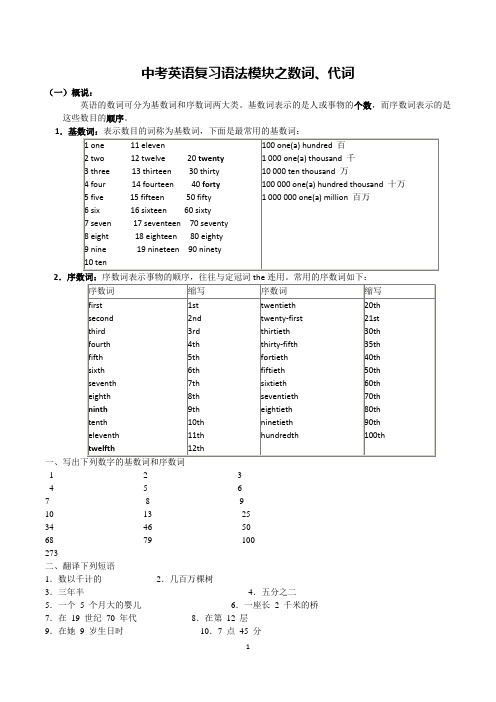
中考英语复习语法模块之数词、代词(一)概说:英语的数词可分为基数词和序数词两大类。
基数词表示的是人或事物的个数,而序数词表示的是这些数目的顺序。
12一、写出下列数字的基数词和序数词1 _________ __________2 _________ __________3 _________ __________4 _________ __________5 _________ __________6 _________ __________7 _________ __________ 8 _________ __________ 9 _________ __________10 _________ __________ 13 _________ __________ 25 _________ __________34 _________ __________ 46 _________ __________ 50 _________ __________68 _________ __________ 79 _________ __________ 100 _________ __________273 _________ __________二、翻译下列短语1.数以千计的___________ 2.几百万棵树______________3.三年半_____________________________________ 4.五分之二________5.一个5 个月大的婴儿____________________ 6.一座长2 千米的桥______________________7.在19 世纪70 年代___________ 8.在第12 层_______________9.在她9 岁生日时________________ 10.7 点45 分___________________________基数词的用法1、表示计量:表示事物的计量,即事物的长度、宽度、深度和高度,应采用基数词。
英语语法大全

英语词类分十种:名词、形容词、代词、数词、冠词、动词、副词、介词、连词、感叹词。
1、名词noun:表示人、事物、地点或抽象概念的名称。
如:boy, morning, bag, ball, class, orange.2、代词pronouns:主要用来代替名词。
如:who, she, you, it .3、数词numeral:表示数目或事物的顺序。
如:one, two, three, first, second, third, fourth.5、动词verb:表示动作或状态。
如:am, is,are,have,see .4、形容词adjective:表示人或事物的性质或特征。
如:good, right, white, orange .6、副词adverb:修饰动词、形容词或其他副词,说明时间、地点、程度等。
如:now, very, here, often, quietly, slowly.7、冠词Article:用在名词前,帮助说明名词。
如:a, an, the.8、介词preposition:表示它后面的名词或代词与其他句子成分的关系。
如in, on, from, above, behind.9、连词conjunction:用来连接词、短语或句子。
如and, but, before .10、感叹词interjection:表示喜、怒、哀、乐等感情。
如:oh, well, hi, hello.构词法:英语构词法主要有:合成法、派生法和转换法。
合成法:spaceship, headache, basketball, playground等等。
派生名词:①动词+er/or ②动词+ing ③动词+(t)ion ④形容词+ness ⑤其他,如:inventor, learner, swimming, congratulation, kindness, carelessness, knowledge派生形容词:①名词+y ②名词+ful ③动词+ing/ed ④friendly ⑤dangerous ⑥Chinese; Japanese ⑦English ⑧French ⑨German ⑩国名+(i)an 如:snowy, sunny, hopeful, beautiful, interesting, follwing, daily(每日的),nervous, delicious派生副词:①形容词+ly ②其它,如:slowly, angrily, full→fully, good→well, possible→possibly等等。
英语语法-代词与数词2
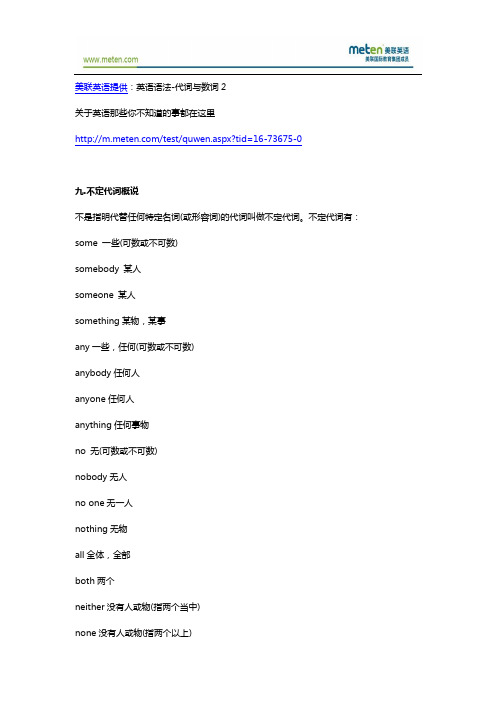
美联英语提供:英语语法-代词与数词2关于英语那些你不知道的事都在这里/test/quwen.aspx?tid=16-73675-0九.不定代词概说不是指明代替任何特定名词(或形容词)的代词叫做不定代词。
不定代词有:some 一些(可数或不可数)somebody 某人someone 某人something某物,某事any一些,任何(可数或不可数)anybody任何人anyone任何人anything任何事物no 无(可数或不可数)nobody无人no one无一人nothing无物all全体,全部both两个neither没有人或物(指两个当中)none没有人或物(指两个以上)either任何一个(指两个当中)each每个every每个everybody每人,大家,人人everyone每人everything每一个事物,一切other (s)另一个(些)another另外一个,又一个much很多(不可数)many很多(可数)few很少(可数)a few一些,几个(可数)little很少(不可数)a little一些(不可数)one一个(人或物)十.不定代词的用法不定代词大都可代替名词和形容词,在句中可用作主语、宾语、表语和定语。
如:1)用作主语Both of them are waiters.他们俩人都是男侍者。
Is everybody here?人都到了吗?2)用作宾语I know little about the novel关于这本小说我知道的很少。
I am speaking for myself,not for others.我只代表自己,不代表别人发言。
I was interested in everything that the old man told me.我对于这位老人告诉我的一切都感兴趣。
3)用作表语That's all for today. class is dismissed.今天就讲这一些。
英语之中名词、代词、动词、形容词、冠词、数词、副词、介词、连词、感叹词

(一)之袁州冬雪创作1、名词名词 (Nouns)是词性的一种,也是实词的一种,是指待人、物、事、时、地、情感、概念等实体或抽象事物的词. 名词可以独立成句.在短语或句子中通常可以用代词来替代.2、代词是代替名词的一种词类.大多数代词具有名词和形容词的功能.英语中的代词,按其意义、特征及在句中的作用分为:人称代词、物主代词、指示代词、自身代词、相互代词、疑问代词、关系代词和不定代词八种.3、动词,就是用来形容或暗示各类动作的词汇.基本上每一个完整的子句都有一个动词,要暗示第二个动作时可以使用不定词、动名词、对等毗连词、从属毗连词或增加子句等方法保持.根据其在句中的功能,动词可分为四类.4、形容词形容词【adjective】很多语言中均有的主要词类中的一种.主要用来修饰名词的词,暗示事物的特征5、冠词的定义冠词是置于名词之前,对名词起限制作用的一种虚词.冠词可以说是名词的一种标记,它不克不及分开名词而独立存在.冠词的分类冠词分为不定冠词"a,an"、定冠词"the"和零冠词三种6、数词暗示"多少"和"第几"的词,叫数词.其用法相当于名词或者形容词.数词分为基数词和序数词两种.暗示数目多少或顺序多少的词叫数词,数词分为基数词和序数词.7、副词(Adverb)副词的定义: 副词是一种用来修饰动词,形容词,副词或全句的词,说明时间,地点,程度,方式等概念.8、介词的定义和特征介词是一种用来暗示词与词, 词与句之间的关系的词.在句中不克不及单独作句字成分.介词后面一般有名词代词或相当于名词的其他词类,短语或从句作它的宾语.(二)1、名词,人或事物的称号3、代词,代替名词或者数词(比方some就是代替数目)3、动词,动作或状态4、数词,暗示数目或顺序(比方序数词,5th就是暗示顺序)5、形容词,人或事物的性质或状态(因为形容词一般修饰名词)6、副词,动作的特征或性状特征(因为副词一般修饰动词或形容词)7、冠词,暗示名词的泛指或特指8、介词,暗示名词或代词与其他词的关系(因为介词后面一半紧跟名词,代词或其他名词性布局)9、连词,毗连词与词,短语与短语,句子与句子10、感叹词,暗示说话时的感情或语气(三)1、adj. / a. 形容词用来描绘一类物质的性质,状态,外貌,或人的性格特点,性质,品格如:big,happy2、adv. / ad. 副词用来修饰动作或形容词,一般在句子中做状语用暗示动作的停止怎样,或暗示程度,特点,如:clearly,happily3、prep. 介词毗连地点,时间的一类词语,可以暗示方位,时间.跟一些暗示时间,地点的词连用暗示介词词组如:in,to,on,under4、conj. 连词用来毗连时间,地点,原因,成果的一类词语如:when,beacuse,so5、num. 数词暗示数字的词,既可以是基数词,也可以是序数词如:one,two,first6、int. 感叹词暗示感叹的一类词,一般不加一诠释,只代表感叹如:what,how,haurray7、vt. 及物动词(后面要加宾语)行为动作的词如:do,finish,play8、vi. 不及物动词(后面不加宾语)暗示行为动作的词如:appear9、n. 名词暗示物体,物质的词如:pig,cow,man10、pron. 代词代指一类人,事或物的词如:he,she,hers,his,things11、art = 冠词,article的缩写(四)在英语语法中主要把词分为8大类:1.名词:暗示人、物或地方等,如:John,teacher;table,pen;London;beauty.2.代词:用来代替名词,以防止重复某个名词,如:I,you,it,that,those,them.3.形容词:用来修饰或限制某个(些)名词,如:good(man),white(paper),every(book),much(water),(John is)hon-est,(He seems)lazy.被修饰或限制的名词,叫做主体词(head-word).4.动词:暗示行为或状态,如:speak,read,go,think,is,seem.5.介词:暗示它后面的名词(或代词)跟它前面的动词、另外一名词或形容词的关系.这些名词(或代词)称为介词的宾语.介词宾语和介词构成介词短语.He went to school.(介词to把名词school和动词went接洽起来)He stood by me.He asked for it.The book on the desk is mine.(介词on把名词book和另外一名词desk接洽起来)He lives in a house on the mountain.他住在山上的一幢房子里.The bridge across this river is built by a Frenchman.河上的桥是一位法国人修建的.He is sure of it.他对此很有掌控.(of接洽it和sure.)It is good for you.这对你有好处.He is angry with Mary.他生玛丽的气.6.副词:修饰或限制动词、形容词或其他副词,甚至介词、连词及整个句子.He walked slowly.他走得很慢.He did it carefully.他干得很仔细.He is a very kind man.他是一个非常善良的人.John is truly honest.约翰的确很诚实.He arrived too late.他到得太晚了.He walked rather slowly.他走得相当慢.He sat far behind me.他坐在我后面挺远的地方.He arrived exactly at seven.他在7点整到达.He will come probably after we take lunch.他能够在我们吃午饭之后到达.He loves her just because she is pretty.他爱她只是因为她漂亮.Luckily,he got back his money.幸好他把钱要回来了. Historically,China is a great nation.从汗青上看中国是个伟大的国家.7.连词:用来毗连词、词组(短语)或句子,如:and,but,or,so;或把一个句子和一动词或名词接洽起来,如:when,because,as,though,that.(连词and把Hong Kong He visited Hong Kong and Singapore.和Singapore毗连起来)他访问了香港和新加坡.She is pretty but cruel.她很漂亮却很残暴.He does exercise in class or at home.他在讲堂上或是在家里做操练.(or把in class和at home两个短语毗连起来)She sat by me,reading novels but turning her eyes tochildren about her from time to time.她坐在我身旁看小说,但不时把眼睛转向她周围的孩子们.He works hard,so he will succeed.他很尽力,所以他会成功.(so把he works hard和he will succeed毗连起来)He says this and that,but he does not mean them.他说这说那,但这些都不是他的真心话.He was writing when it was rainning.下雨时他正在写作.(when把动词was raining和he was writing毗连起来)He became a beggar because he had been a gambler.他成了乞丐因为他爱赌博.He went to school though he was sick.他虽病了,但他仍然上学.The news that the enemy had surrendered soon reached us.不久传来了敌人投降的消息.8.感叹词:用来暗示说话时的感情,如Oh!,Alas!,My!上面只是对8大词类粗略的诠释.别的冠词、数词也可算作两个词类,冠词只有a,an,the3个字,数词可归入形容词中.。
2014高中英语语法大全:代词和数词

2014⾼中英语语法⼤全:代词和数词 店铺⾼考频道在考试后及时公布各科⾼考试题答案和⾼考作⽂及试卷专家点评,请⼲⼤考⽣家⻓关注。
时光⻜逝,暑假过去了,新学期开始了,不管情愿与否,⽆论准备与否,我们已⾛进⾼三,⾛近我们的梦!祝愿决战2014⾼考的新⾼三学员能倍加努⼒,在2014年⾼考中也能取得优异的成绩。
代词和数词 代词 ⼀. ⼈称代词 1. 主格和宾格 1) 通常,⼈称代词主格⽤做主语或表语;宾格⽤做动词或介词的宾语。
句⼦的结构如有变 化,也应能加以分析,确定选⽤哪种形式。
例如: It was he who told a lie. It’s not me (who / whom) he wants. (作宾语) This is a secret;it's between you and me.(作介词宾语) 2) ⼈称代词宾格可⽤在⽐较状语从句⼀类的结构中代替主格。
例如: He is taller than me / I (am). I don't swim so well as her / she (does). 2. 两种所有格 ⼈称代词所有格称为物主代词。
物主代词分为两类: ①形容词性的,如my, her, your, their等; ②名词性的,如mine,hers,yours,theirs等。
由于受汉语影响,我们常犯以下两种错误: 1) 漏⽤代词,主要是形容词性的物主代词,因为汉语中常常将它省略。
例如: I have done my homework.(不能说 * I have done homework.) We clean our classroom every day.(不能说 * We clean classroom every day.) 2) 误⽤代词,混淆两种类型的物主代词,因为汉语中⽆此区别。
例如: That dictionary is not mine.(不能说 * That dictionary is not my.) Mine is here.(不能说 * My is here.) 注意:形容词性的物主代词只能⽤作定语,必须与名词连⽤。
中考英语语法复习名词代词数词冠词和介词
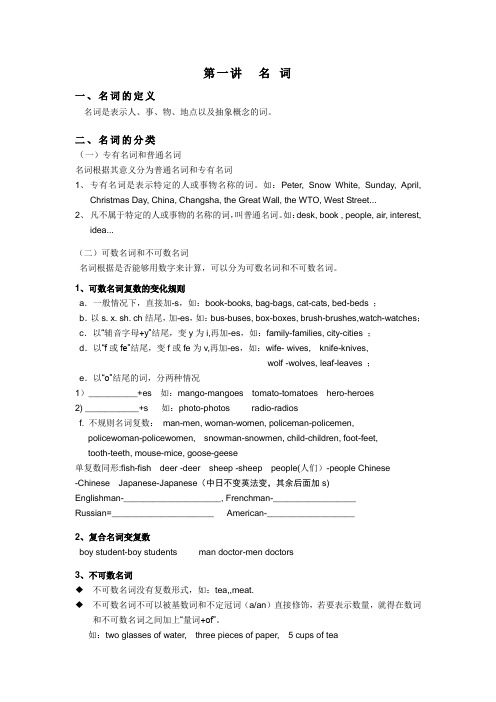
第一讲名词一、名词的定义名词是表示人、事、物、地点以及抽象概念的词。
二、名词的分类(一)专有名词和普通名词名词根据其意义分为普通名词和专有名词1、专有名词是表示特定的人或事物名称的词。
如:Peter, Snow White, Sunday, April,Christmas Day, China, Changsha, the Great Wall, the WTO, West Street...2、凡不属于特定的人或事物的名称的词,叫普通名词。
如:desk, book , people, air, interest,idea...(二)可数名词和不可数名词名词根据是否能够用数字来计算,可以分为可数名词和不可数名词。
1、可数名词复数的变化规则a.一般情况下,直接加-s,如:book-books, bag-bags, cat-cats, bed-beds ;b.以s. x. sh. ch结尾,加-es,如:bus-buses, box-boxes, brush-brushes,watch-watches;c.以“辅音字母+y”结尾,变y为i,再加-es,如:family-families, city-cities ;d.以“f或fe”结尾,变f或fe为v,再加-es,如:wife- wives, knife-knives,wolf -wolves, leaf-leaves ;e.以“o”结尾的词,分两种情况1)__________+es 如:mango-mangoes tomato-tomatoes hero-heroes2) ___________+s 如:photo-photos radio-radiosf. 不规则名词复数:man-men, woman-women, policeman-policemen,policewoman-policewomen, snowman-snowmen, child-children, foot-feet,tooth-teeth, mouse-mice, goose-geese单复数同形:fish-fish deer -deer sheep -sheep people(人们)-people Chinese-Chinese Japanese-Japanese(中日不变英法变,其余后面加s)Englishman-____________________, Frenchman-_________________Russian=_____________________ American-__________________2、复合名词变复数boy student-boy students man doctor-men doctors3、不可数名词◆不可数名词没有复数形式,如:tea,,meat.◆不可数名词不可以被基数词和不定冠词(a/an)直接修饰,若要表示数量,就得在数词和不可数名词之间加上“量词+of”。
英语语法代词和数词

代词和数词(一)代词分类代词是代替名词的词,主要是为了避免名词的重复。
根据代词表达的意义和用法,代词可以分几类:人称代词:主格:I,you,he,she,it,they,we, 宾格:me,you,him,her,it,them,us 物主代词:形容词性:my,your,his ,her,its,our,their 名词性:mine,yours,his,hers,its,theirs,ours反身代词:myself(ourselves),himself,herself,itself(themselves),yourself(yourselves)指示代词:this,that,these,those...疑问代词:what,who,when...不定代词:some, something...关系代词:which,who,that...连接代词:which,who...(二)代词的用法1.不定代词的用法(1)few, a few, little, a littleFew, little 表示没有多少,含否定意义。
A few 和a little 表示有一些,含肯定意义。
另外,few,a few 可以修饰可数名词,little和a little修饰不可数名词。
(2)other 和anotherOther 泛指“另外的”作定语与复数名词或单数不可数名词连用,但前面有the,this ,that,some,any,each,no,none,one,or,every 以及形容词性物主代词是,可与单数名词连用,如:other boys, the other one,every other day等Others泛指“别的人或物”(但不是全部)如:Some are playing basketball,and others are playing football.The other 指“两者中的另一个”常与one 连用,表示另一方的“全部其余的”如:There are ten balls,two of them are red, the others are yellow.(the others 是the other 的复数形式)Another 指三个或三个以上中的“任何一个”,“再一”“另一个”。
初中英语——代词+数词
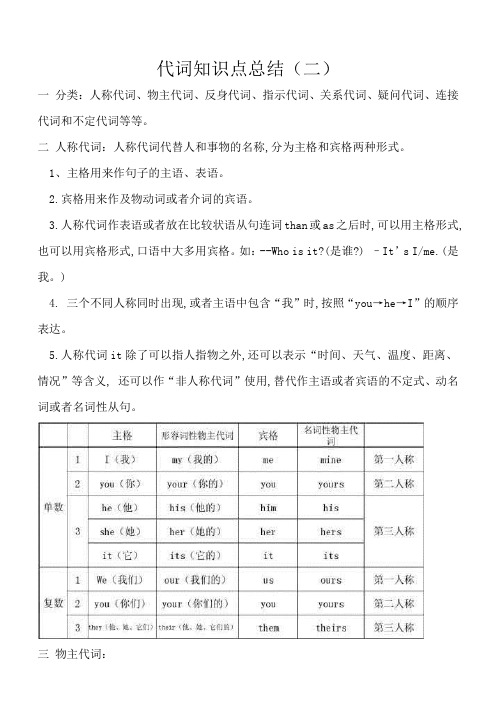
代词知识点总结(二)一分类:人称代词、物主代词、反身代词、指示代词、关系代词、疑问代词、连接代词和不定代词等等。
二人称代词:人称代词代替人和事物的名称,分为主格和宾格两种形式。
1、主格用来作句子的主语、表语。
2.宾格用来作及物动词或者介词的宾语。
3.人称代词作表语或者放在比较状语从句连词than或as之后时,可以用主格形式,也可以用宾格形式,口语中大多用宾格。
如:--Who is it?(是谁?) –It’s I/me.(是我。
)4. 三个不同人称同时出现,或者主语中包含“我”时,按照“you→he→I”的顺序表达。
5.人称代词it除了可以指人指物之外,还可以表示“时间、天气、温度、距离、情况”等含义, 还可以作“非人称代词”使用,替代作主语或者宾语的不定式、动名词或者名词性从句。
三物主代词:说明事物所属关系的代词,分为形容词性和名词性两种。
1、形容词性物主代词只能作句子中名词的修饰语,后面要跟名词。
2、名词性物主代词相当于名词,既代替事物又表明所属关系,在句子中往往独立地作主语、宾语或者表语,后面千万不可以跟名词。
四.反身代词:表示谓语的动作与主语有关或者宾语补足语的动作与宾语有关。
在句中作宾语或同位语五.指示代词:既可以单独使用做句子的主语、宾语或表语,也可以作定语修饰名词。
有this, that, these, those, such,same,it等六.关系代词:用来引导定语从句的代词叫关系代词,1、关系代词who 、which、 that 、whom 等,将定语从句和主句连接起来。
英语中的关系代词一方面在从句中担任一定的成分,另一方面又起连接作用。
如:The student who is drawing a picture is in Grade One.2、关系代词who / whom指人,如果作从句的宾语,则有时省略。
如: Do you know the man who is wearing a red hat?3、关系代词which 指物,如果作从句的宾语,则有时省略。
英语语法解析

2、普通名词是许多人或事物的共有名称。如:pupil, family, man, foot.
普通名词又分为可数名词和不可数名词。
▲可数名词是可以用简单的数词进行计数的名词,如: box, child, orange;
有时可把介词to或for加在间接宾语前构成短语,放在直接宾语后面,来强调间接宾语。如:He wrote a letter to me . (他给我写了一封信)
5、定语修饰名词或代词,通常由形容词、代词、数词等担任。如:
Shanghai is a big city .(上海是个大城市)
②s,o,x ,sh,ch结尾的词加es.如:class→classes, box→boxes, hero→heroes, dish→dishes, bench→benches.
[注]:少数以o结尾的词,变复数时只加s。如:photo→photos, piano→pianos.
③以辅音字母加y结尾的名词,变y为i,再加es。如:family→families, city→cities, party→parties.
二、名词:
1、英语名词可分专有名词和普通名词两大类:
1、专有名词是个别的人、地、物、团体、机构等的专用名称。
专有名词中实词的第一个字母要大写。
如:Beijing, Tom, the People’s Republic of China(中华人民共和国)
专有名词如果是含有普通名词的短语,则必须使用定冠词the。如:the Great Wall(长城)
4、maths, news等虽然有s结尾,但不是复数,因此谓语仍用单数:The news is very exciting. (这个消息令人兴奋)
高中英语语法系统讲解之二代词和数词

高中英语语法系统讲解之二代词和数词代词根据指代对象的不同,代词可分为人称代词、物主代词、反身代词、指示代词、不定代词、相互代词、疑问代词、连接代词和关系代词等。
一. 人称代词:有主格个宾格两种形式,它们也有单复数变化,具体情况如下:1. 人称代词的主格在句中作主语或表语。
如Tom waited a while but eventually he went home.Tom hoped the passenger would be Lily and indeed it was she.温馨提示:在复合句中,如果主句和从句主语相同,代词主语要用在从句中,名词主语用在主句中。
如When he arrived, Tom went straight to the bank.2. 人称代词的宾格在句子中作宾语或介词宾语,但在口语中也能作表语。
如I saw her with them, at least, Ithought it was her.(前一个her作宾语,them作介词宾语,后一个her作表语)3. 人称代词的指代问题○1不定代词anybody,everybody,nobody,anyone,someone,everyone,on one,及whoever和person 在正式场合使用时,可he,his,him代替。
如Nobody came, did he?○2动物名词的指代一般用it或they代替,有时也用he,she,带有亲切的感情色彩。
如Give the kitty some food. She is hungry.○3指代国家、船舶、车辆等的名词,含感情色彩时常用she。
如China will always do what she has promised to do.5. 并列人称代词的排列顺序○1单数人称代词并列作主语时,其顺序为:第二人称+ 第三人称+ 第一人称。
如You, he and I are of the same age.○2复数人称代词作主语时,其顺序为:第一人称+ 第二人称+ 第三人称。
英语之中名词、代词、动词、形容词、冠词、数词、副词、介词、连词、感叹词
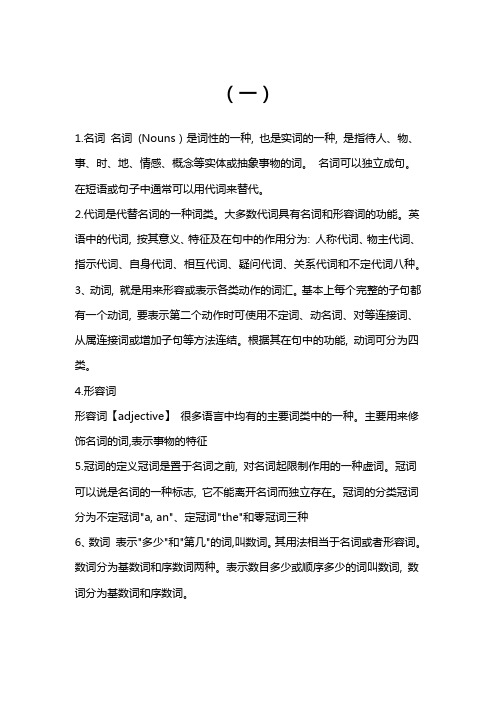
(一)1.名词名词(Nouns)是词性的一种, 也是实词的一种, 是指待人、物、事、时、地、情感、概念等实体或抽象事物的词。
名词可以独立成句。
在短语或句子中通常可以用代词来替代。
2.代词是代替名词的一种词类。
大多数代词具有名词和形容词的功能。
英语中的代词, 按其意义、特征及在句中的作用分为: 人称代词、物主代词、指示代词、自身代词、相互代词、疑问代词、关系代词和不定代词八种。
3、动词, 就是用来形容或表示各类动作的词汇。
基本上每个完整的子句都有一个动词, 要表示第二个动作时可使用不定词、动名词、对等连接词、从属连接词或增加子句等方法连结。
根据其在句中的功能, 动词可分为四类。
4.形容词形容词【adjective】很多语言中均有的主要词类中的一种。
主要用来修饰名词的词,表示事物的特征5.冠词的定义冠词是置于名词之前, 对名词起限制作用的一种虚词。
冠词可以说是名词的一种标志, 它不能离开名词而独立存在。
冠词的分类冠词分为不定冠词"a, an"、定冠词"the"和零冠词三种6、数词表示"多少"和"第几"的词,叫数词。
其用法相当于名词或者形容词。
数词分为基数词和序数词两种。
表示数目多少或顺序多少的词叫数词, 数词分为基数词和序数词。
7、副词(Adverb)副词的定义: 副词是一种用来修饰动词,形容词,副词或全句的词,说明时间,地点,程度,方式等概念。
8、介词的定义和特征介词是一种用来表示词与词, 词与句之间的关系的词。
在句中不能单独作句字成分。
介词后面一般有名词代词或相当于名词的其他词类, 短语或从句作它的宾语。
(二)1.名词, 人或事物的名称3.代词, 代替名词或者数词(比如some就是代替数目)3.动词, 动作或状态4.数词, 表示数目或顺序(比如序数词, 5th就是表示顺序)5.形容词, 人或事物的性质或状态(因为形容词一般修饰名词)6.副词, 动作的特征或性状特征(因为副词一般修饰动词或形容词)7、冠词, 表示名词的泛指或特指8、介词, 表示名词或代词与其他词的关系(因为介词后面一半紧跟名词, 代词或其他名词性结构)9、连词, 连接词与词, 短语与短语, 句子与句子10、感叹词, 表示说话时的感情或语气(三)1.adj./ a.形容词用来描述一类物质的性质,状态,外貌,或人的性格特点,性质,品格如:big,happy2.adv./ ad.副词用来修饰动作或形容词,一般在句子中做状语用表示动作的进行怎样,或表示程度,特点,如:clearly,happily3.prep.介词连接地点,时间的一类词语,可以表示方位,时间.跟一些表示时间,地点的词连用表示介词词组如:in,to,on,under4.conj.连词用来连接时间,地点,原因,结果的一类词语如:when,beacuse,so5.num.数词表示数字的词,既可以是基数词,也可以是序数词如:one,two,first6.int.感叹词表示感叹的一类词,一般不加一解释,只代表感叹如:what,how,haurray7、vt.及物动词(后面要加宾语)行为动作的词如:do,finish,play8、vi.不及物动词(后面不加宾语)表示行为动作的词如:appear9、n.名词表示物体,物质的词如:pig,cow,man10、pron.代词代指一类人,事或物的词如:he,she,hers,his,things11.art = 冠词, article的缩写(四)在英语语法中主要把词分为8大类:1. 名词: 表示人、物或地方等, 如: John, teacher;table, pen;London;beauty.2. 代词: 用来代替名词, 以避免重复某个名词, 如: I, you, it, that, those, them.3.形容词:用来修饰或限制某个(些)名词, 如:good(man), white (paper), every(book), much(water), (John is)hon-est, (He seems)lazy.被修饰或限制的名词, 叫做主体词(head-word)。
语法专题 专题二 代词与数词(共37张PPT)

综合演练
对点训练 单句语法填空 1. More seriously, _th_o_s_e_____ who don't have breakfast have poor academic performances. 2. _W__h_a_t____ makes our hometown so attractive these years? 3. _W__h_o_____ was playing basketball before I went to the concert? 4. _W__h_a_t____ factors lead to a higher enjoyment of school? 5. Both Helen and Jill speak Spanish, but __w_h_o_s_e___ pronunciation is better?
综合演练
不定代词是不指明代替任何特定名词或形容词的代词,有 one, each, everyone, everybody, everything, some, someone, somebody, something, few, a few, little, a little, none, all,both, no, nobody, nothing, either, neither, others 等。
综合演练
考点三 指示代词、相互代词、疑问代词 考点分析
指示代词是表示指示概念的代词,即用来指示或标记人或事物的代 词。 1. 指示代词有 this, that, these, those。this 指在时间或空间上较近的人或 物,意为“这;这个”;that 指在时间或空间上较远的人或物,意为“那; 那个”;these 指在时间或空间上较近的人或物,意为“这些”;those 指 在时间或空间上较远的人或物,意为“那些”。
英语语法代词,数词
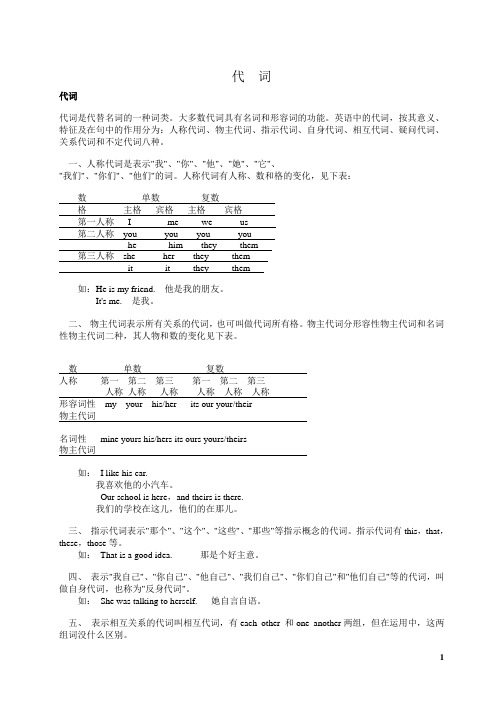
代词代词代词是代替名词的一种词类。
大多数代词具有名词和形容词的功能。
英语中的代词,按其意义、特征及在句中的作用分为:人称代词、物主代词、指示代词、自身代词、相互代词、疑问代词、关系代词和不定代词八种。
一、人称代词是表示"我"、"你"、"他"、"她"、"它"、"我们"、"你们"、"他们"的词。
人称代词有人称、数和格的变化,见下表:数单数复数格主格宾格主格宾格第一人称I me we us第二人称you you you youhe him they them第三人称she her they themit it they them如:He is my friend.他是我的朋友。
It's me.是我。
二、物主代词表示所有关系的代词,也可叫做代词所有格。
物主代词分形容性物主代词和名词性物主代词二种,其人物和数的变化见下表。
数单数复数人称第一第二第三第一第二第三人称人称人称人称人称人称形容词性my your his/her its our your/their物主代词名词性mine yours his/hers its ours yours/theirs物主代词如:I like his car.我喜欢他的小汽车。
Our school is here,and theirs is there.我们的学校在这儿,他们的在那儿。
三、指示代词表示"那个"、"这个"、"这些"、"那些"等指示概念的代词。
指示代词有this,that,these,those等。
如:That is a good idea.那是个好主意。
四、表示"我自己"、"你自己"、"他自己"、"我们自己"、"你们自己"和"他们自己"等的代词,叫做自身代词,也称为"反身代词"。
英语之中名词、代词、动词、形容词、冠词、数词、副词、介词、连词、感叹词.doc

(一)1、名词名词 (Nouns )是词性的一种,也是实词的一种,是指待人、物、事、时、地、情感、概念等实体或抽象事物的词。
名词可以独立成句。
在短语或句子中通常可以用代词来替代。
2、代词是代替名词的一种词类。
大多数代词具有名词和形容词的功能。
英语中的代词,按其意义、特征及在句中的作用分为:人称代词、物主代词、指示代词、自身代词、相互代词、疑问代词、关系代词和不定代词八种。
3、动词,就是用来形容或表示各类动作的词汇。
基本上每个完整的子句都有一个动词,要表示第二个动作时可使用不定词、动名词、对等连接词、从属连接词或增加子句等方法连结。
根据其在句中的功能,动词可分为四类。
4、形容词形容词【 adjective】很多语言中均有的主要词类中的一种。
主要用来修饰名词的词 , 表示事物的特征5、冠词的定义冠词是置于名词之前,对名词起限制作用的一种虚词。
冠词可以说是名词的一种标志,它不能离开名词而独立存在。
冠词的分类冠词分为不定冠词"a ,an" 、定冠词 "the" 和零冠词三种6、数词表示 " 多少 " 和" 第几 " 的词 , 叫数词。
其用法相当于名词或者形容词。
数词分为基数词和序数词两种。
表示数目多少或顺序多少的词叫数词,数词分为基数词和序数词。
7、副词 (Adverb) 副词的定义: 副词是一种用来修饰动词 , 形容词 , 副词或全句的词 , 说明时间 , 地点 , 程度 , 方式等概念。
8、介词的定义和特征介词是一种用来表示词与词, 词与句之间的关系的词。
在句中不能单独作句字成分。
介词后面一般有名词代词或相当于名词的其他词类,短语或从句作它的宾语。
(二)1、名词,人或事物的名称3、代词,代替名词或者数词(比如some就是代替数目)3、动词,动作或状态4、数词,表示数目或顺序(比如序数词,5th就是表示顺序)5、形容词,人或事物的性质或状态(因为形容词一般修饰名词)6、副词,动作的特征或性状特征(因为副词一般修饰动词或形容词)7、冠词,表示名词的泛指或特指8、介词,表示名词或代词与其他词的关系(因为介词后面一半紧跟名词,代词或其他名词性结构)9、连词,连接词与词,短语与短语,句子与句子10、感叹词,表示说话时的感情或语气(三)1、adj. / a.形容词用来描述一类物质的性质, 状态 , 外貌 ,或人的性格特点 , 性质 , 品格如:big,happy2、adv. / ad.副词用来修饰动作或形容词, 一般在句子中做状语用表示动作的进行怎样 , 或表示程度 , 特点 ,如:clearly,happily3、prep.介词连接地点 , 时间的一类词语 , 可以表示方位 , 时间 . 跟一些表示时间, 地点的词连用表示介词词组如:in,to,on,under4、conj.连词用来连接时间 , 地点 , 原因, 结果的一类词语如:when,beacuse,so5、num. 数词表示数字的词 , 既可以是基数词 , 也可以是序数词如:one,two,first6、int.感叹词表示感叹的一类词 , 一般不加一解释 , 只代表感叹如:what,how,haurray7、vt.及物动词(后面要加宾语)行为动作的词如:do,finish,play8、vi.不及物动词(后面不加宾语)表示行为动作的词如:appear9、n. 名词表示物体 , 物质的词如:pig,cow,man10、pron.代词代指一类人 , 事或物的词如:he,she,hers,his,things11、art =冠词,article的缩写(四)在英语语法中主要把词分为8 大类:1.名词:表示人、物或地方等,如:John,teacher ;table ,pen;London;beauty .2.代词:用来代替名词,以避免重复某个名词,如: I ,you,it ,that ,those ,them.3.形容词:用来修饰或限制某个(些)名词,如: good(man),white (paper ),every(book),much(water ),(John is )hon-est ,(He seems)lazy .被修饰或限制的名词,叫做主体词(head-word)。
(完整版)英语语法常用词汇
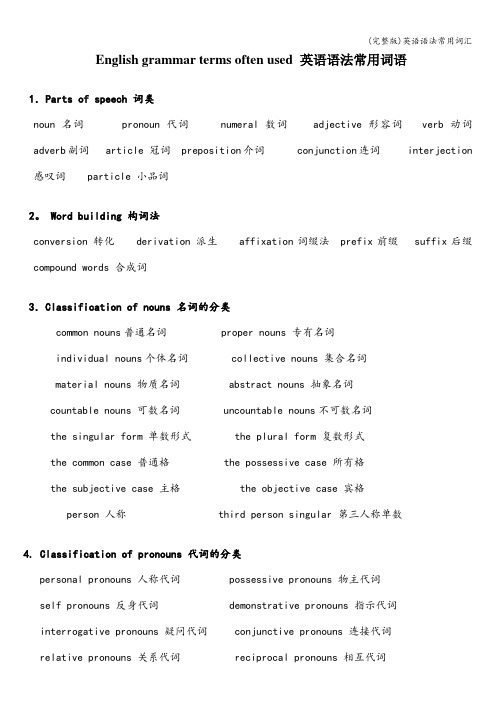
English grammar terms often used 英语语法常用词语1.Parts of speech 词类noun 名词 pronoun 代词 numeral 数词 adjective 形容词 verb 动词adverb副词 article 冠词 preposition介词 conjunction连词 interjection 感叹词 particle 小品词2。
Word building 构词法conversion 转化 derivation 派生 affixation词缀法 prefix前缀 suffix后缀compound words 合成词3.Classification of nouns 名词的分类common nouns普通名词 proper nouns 专有名词individual nouns个体名词 collective nouns 集合名词material nouns 物质名词 abstract nouns 抽象名词countable nouns 可数名词 uncountable nouns不可数名词the singular form 单数形式 the plural form 复数形式the common case 普通格 the possessive case 所有格the subjective case 主格 the objective case 宾格person 人称 third person singular 第三人称单数4. Classification of pronouns 代词的分类personal pronouns 人称代词 possessive pronouns 物主代词self pronouns 反身代词 demonstrative pronouns 指示代词interrogative pronouns 疑问代词 conjunctive pronouns 连接代词relative pronouns 关系代词 reciprocal pronouns 相互代词indefinite pronouns 不定代词5.数词、形容词、冠词cardinal numerals 基数词 ordinal numerals 序数词fractional numerals 分数词 the comparative degree 比较级the superlative degree 最高级 The definite article 定冠词the indefinite article 不定冠词6.Classification of verbs 动词的分类national verbs 实义动词 link-verbs系动词auxiliary verbs助动词 modal verbs 情态动词transitive verbs 及物动词 intransitive verbs 不及物动词regular verbs 规则动词 irregular verbs 不规则动词the present forms 现在式 the past forms 过去式the participle 分词 the present participle现在分词the past participle 过去分词 the infinitive 不定式the gerund 动名词 bare infinitive 不带to的不定式7.Tense 时态the present tense 一般现在时 the past tense 一般过去时the future tense一般将来时 the past future tense一般过去将来时the present continuous现在进行时 the past continuous 过去进行时the future continuous 将来进行时 the past future continuous过去将来进行时 the present perfect 现在完成时 the past perfect过去完成时the future perfect 将来完成时 the past future perfect 过去将来完成时the present perfect continuous现在完成进行时the future perfect continuous 将来完成进行时the past future perfect continuous 过去将来完成进行时8.Voice 语态、Mood 语气the passive voice 被动语态 the active voice 主动语态the indicative mood 陈述语气 the imperative mood 祈使语气the subjunctive mood 虚拟语气9.Classification of adverbs 副词的分类adverbs of place 地点副词 adverbs of time 时间副词adverbs of degree程度副词 adverbs of manner 方式副词adverbs of frequency频度副词 relative adverbs 关系副词interrogative adverbs 疑问副词 conjunctive adverbs连接副词10. Members of the sentence 句子成分the subject 主语 the predicate 谓语 the predicative 表语 the object 宾语 the attribute 定语 the adverbial 状语 the appositive 同位语independent elements 独立成分 the direct object 直接宾语the indirect object 间接宾语 parenthesis 插入语the double possessive 双重所有格 the formal subject/object 形式主语/宾语subject complement 主语补足语 object complement 宾语补足语11.Classification of sentences句子的分类declarative sentences 陈述句 imperative sentences 祈使句exclamatory sentences感叹句 interrogative sentences 疑问句general questions 一般疑问句 special questions 特殊疑问句alternative questions选择疑问句 disjunctive questions 反意疑问句tap questions 附加疑问句 simple sentences 简单句compound sentences 复合句 complex sentences 并列句elliptical sentences 省略句phrase 短语preposition phrases 介词短语infinitive phrases 不定式短语 the question word 疑问词12.Clauses 从句main clauses 主句 subject clauses 主语从句object clauses宾语从句 direct speech 直接引语indirect speech 间接引语 predicate clauses 谓语从句predicative clauses 表语从句 attributive clauses定语从句restrictive attributive clauses 限定性定语从句the antecedent 先行词non—restrictive attributive clauses 非限定性定语从句appositive clauses同位语从句 adverbial clauses状语从句adverbial clauses oftime/ place / cause / condition / degree / result / concession / purpose / comparison /manner 时间/地点/原因/条件/程度/结果/让步/目的/比较/方式状语从句 sentences of real condition真实条件句 sentences of unreal condition 虚拟条件句 natural word-order 自然语序 inverted word—order 倒装语序full inversion 完全倒装 partial inversion 部分倒装ellipsis 省略 transformation of sentences 句型转换analysis of sentences 句子分析13。
高考英语语法专项突破:代词和数词
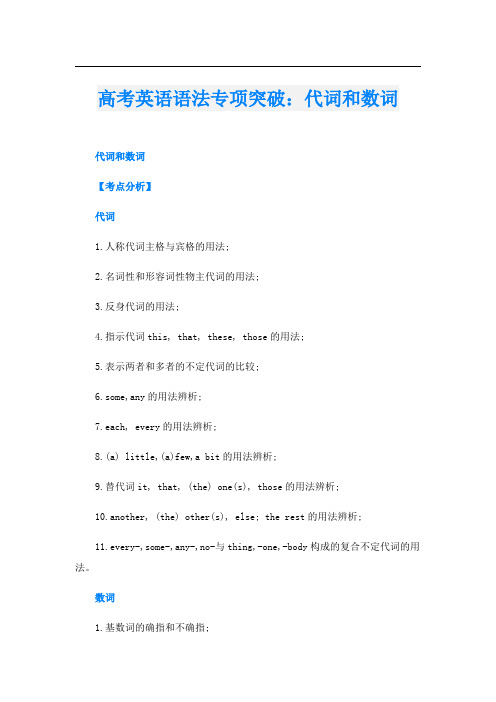
高考英语语法专项突破:代词和数词代词和数词【考点分析】代词1.人称代词主格与宾格的用法;2.名词性和形容词性物主代词的用法;3.反身代词的用法;4.指示代词this, that, these, those的用法;5.表示两者和多者的不定代词的比较;6.some,any的用法辨析;7.each, every的用法辨析;8.(a) little,(a)few,a bit的用法辨析;9.替代词it, that, (the) one(s), those的用法辨析;10.another, (the) other(s), else; the rest的用法辨析;11.every-,some-,any-,no-与thing,-one,-body构成的复合不定代词的用法。
数词1.基数词的确指和不确指;2.数词与主谓一致关系;3.dozen和score的用法;4.序数词与冠词的连用。
【知识点归纳】(一)代词代词是高考考查的重点语法项目之一,也是考生容易出错的项目,因为代词具有较大灵活性。
考生在做代词选择填空时最容易犯的错误是1)机械地套用语法规则;2)用汉语思维去分析题意。
从高考考查情况看,高考考查最多的是不定代词,因为不定代词是整个代词中最为活跃的部分,其次是名词性物主代词和反身代词。
I.代词的分类II.代词的用法1.人称代词①在句中作主语,用主格,在句中作宾语,则用宾格;She teaches them physics.②在句中作表语,常用宾格;Who is it? Its me.但有时要用主格:It was I who told him the whole story. 在强调句型中,强调的是主语,故I用主格。
③两个或两个以上的人称代词并列时,其顺序是:单数按2,3,1人称排列,复数按1,2,3人称顺序排列。
you, she and I ; we, you and they2.物主代词①形容词性物主代词只能作宾语We love our motherland.②名词性物主代词可用作主语,表语和宾语Your coat is black while mine is red.3.反身代词①用作宾语、表语,或主语、宾语的同位语He teaches himself Japanese every evening.(宾语)She is not quite herself today.她今天身体不太舒服。
- 1、下载文档前请自行甄别文档内容的完整性,平台不提供额外的编辑、内容补充、找答案等附加服务。
- 2、"仅部分预览"的文档,不可在线预览部分如存在完整性等问题,可反馈申请退款(可完整预览的文档不适用该条件!)。
- 3、如文档侵犯您的权益,请联系客服反馈,我们会尽快为您处理(人工客服工作时间:9:00-18:30)。
英语语法英语语法——————代词与数词代词与数词主编:汤敏英语语法英语语法——————代词与数词代词与数词主编:汤敏代词一.概说定义:代词(pronoun)是代替名词的词:1.1代词在句子中的功用1)和名词一样,可作主语、宾语和表语。
b)有些代词和形容词一样,可作定语。
如:I am reading The Arabian Nights.我在读《天方夜谭》。
(作主语)This is John Smith speaking.(打电话用语)我是约翰•史密斯。
(作主语)Can I help you?我能帮你的忙吗?(作宾语)That's all.我的话完了。
(作表语)2)His father is an eye-doctor.他父亲是个眼科医生。
(作定语)All men are equal.所有的人都是平等的。
(作定语)3)格的变化有些代词有格的变化,如I 我(主格),me 我(宾格),Who 谁(主格),whom 谁(宾格)。
某些代词有所有格,如whose 谁的,other's 别人的,somebody's 某人的,one's 一个人的。
4)单复数形式有些代词有单数和复数形式。
少数代词的复数形式和名词的复数形式的变化规则相同,如one-ones ,other-others 。
其他如人称代词、物主代词、自身代词和指示代词等,其复数形式与此不同,须个别记忆。
5)有或没有冠词代词之前一般不用冠词,只有少数例外。
如:the other ,the others ,a few ,a little 等。
种类1.2英语有下列几种代词:1)人称代词(personal pronoun)a)主格:I ,he ,she ,it ,we ,you ,they.b)宾格:me ,him ,her ,it ,us ,you ,them.2)物主代词(possessive pronoun):a)形容词性物主代词:my ,his ,her ,its ;our ,your ,their.b)名词性物主代词:mine ,his ,hers ,its ,ours ,yours ,theirs.3)自身代词(self-pronoun):myself ,yourself ,himself ,herself ,itself ,ourselves ,yourselves ,themselves ,oneself.4)相互代词(reciprocal pronoun):each other,one another.5)指示代词(demonstrative pronoun):this,that,these,those,such,same.6)疑问代词(interrogative pronoun):who,whom,whose,which,what.7)关系代词(relative pronoun):who,whom,whose,which,that.8)不定代词(indefinite pronoun):some,something,somebody,someone,any,anything,anybody,anyone,no,nothing,nobody,no one,every,everything,everybody,everyone,each,much,many,little,a little,few,a few,other,another,all,none,one,both,either,neither.二.人称代词概说表示"我',、"你"、"他"、"我们"、"你们"、"他们"等的词,叫做人称代词。
人称代词的用法人称代词主格的用法1)1)人称代词主格的用法a)作主语I am a cook.(炊事员)We are cooks,You are a teacher.(教师)You are teachers.He is a barber.(理发员)The yare barbers.She is a nurse.(护士)The yare nurses.It is a cart.(大车)They are carts.b)作表语It's I.是我。
Oh,it's you.噢,是你。
[注一]第一人称单数人称代词I(我)永远要大写。
(见上面例句)[注二]口语习惯上不说it's I(he,she等),而说It's me(him,her等)。
人称代词宾格的用法2)2)人称代词宾格的用法a)作及物动词的宾语The dog bit him.那只狗咬了他。
Our P.T.teacher taught us to swim yesterday.我们的体育老师昨天教我们游泳。
This is my new hat.Do you like it?这是我的新帽子,你喜欢吗?b)作介词的宾语My brother often writes tome.我弟弟常给我写信。
They took good care of us.他们无微不至地照料我们。
3)人称代词的其他用法各人称代词除按照自身的人称、数和格使用外,还有下列一些特殊用法:a)报刊的编辑和文章的作者,在发表观点时,常用we代替I(同样用our代替my)。
如:We believe that China will make still greater progress in shipbuilding.我们相信中国的造船业将会有更大的发展。
In our opinion this is the best film of the year.我们认为这是今年最好的影片。
b)用she来代替国家、城市、船舶、飞机以及动物等,以表示亲切和爱抚。
如:That's the picture of the Dongfeng;she is a10,000-ton class ocean-going freighter.那是万吨远洋货轮东风号的照片。
The dog waved his tail when he saw his master.那狗看见主人就摇尾巴。
c)北有时可用来代替小孩(child)和婴儿(baby)。
如:The child smiled when it saw its mother.小孩见到母亲就笑了。
d)they可用来代替一般的人,特别在"they say"中。
如:They say there's going to be another good harvest this year.人们说今年又是个丰收年。
三.物主代词概说表示所有关系的代词叫做物主代词,也可叫做代词所有格。
物主代词的用法形容词性物主代词用作定语1)1)形容词性物主代词用作定语I love my work in the hospital.我喜欢我在医院的工作。
How many students are there in his(her)class?他(她)班上有多少学生?There are many good teachers in our school.我们学校有许多好老师。
I saw a film lasts saturday.Its title was Guerrillas on the Plains.我上星期六看了一个电影,名叫《平原游击队》。
名词性物主代词用作主语、宾语和表语2)2)名词性物主代词用作主语、宾语和表语a)用作主语:Our room is on the first floor,and theirs is on the second我们的房间在一层,他们的在二层。
Ours is a socialist country.我们的国家是社会主义国家。
b)用作宾语:I didn't borrow her dictionary.I borrowed his.我没有借她的字典,我借的是他的。
c)用作表语:Whose pencil is this?-It is hers.这是谁的铅笔?--是她的。
These tools are ours.这些工具是我们的。
[注]"of+名词性物主代词"和2.12的"of+名词所有格"的用法完全一样。
如:a friend of mine 我的一个朋友(表示部分观念,意即我有不少朋友,他(她)是其中之一)this lovely child of yours 你的这个可爱的孩子(有感情色彩)四.自身代词概说表示反射(指一个动作回射到该动作执行者本身)或强调(即用来加强名词或代词的语气)的代词叫做自身代词。
自身代词的用法1)1)在句中作宾语,表示动作回到动作执行者的本身。
如:在句中作宾语,表示动作回到动作执行者的本身。
如:Please help yourself to some lea.请自己用茶。
(作help 的宾语)The girl is too young to look after herself.这女孩太小,还不能照顾自己。
(作look after 的宾语)He was always ready to help others;he never thought of himself 他总是帮助别人,从不想到自己。
(作thought of 的宾语)2)2)在句中作名词或代词的同位语在句中作名词或代词的同位语在句中作名词或代词的同位语,,用来加强名词或代词的语气,作"亲自"、"本人"解。
它在句中可置于名词、代词之后,也可置于句子末尾。
如:You yourself said so.你自己是这样说的。
The desk itself is not so heavy.书桌本身并不重。
I fixed the window myself.这窗户是我自己装的。
五.相互代词表示相互关系的代词叫做相互代词。
相互代词的用法1)1)作宾语。
作宾语。
如:Do you often see one another?你们彼此常见面吗?New and old students learn from each other.新老同学相互学习。
.John and Tom helped each other.约翰和汤姆相互帮助。
2)2)作定语时须用所有格。
作定语时须用所有格。
如:We are interested in one another's work.我们关心彼此的工作。
The students corrected each other's mistakes in their homework.学生相互改作业中的错误。
